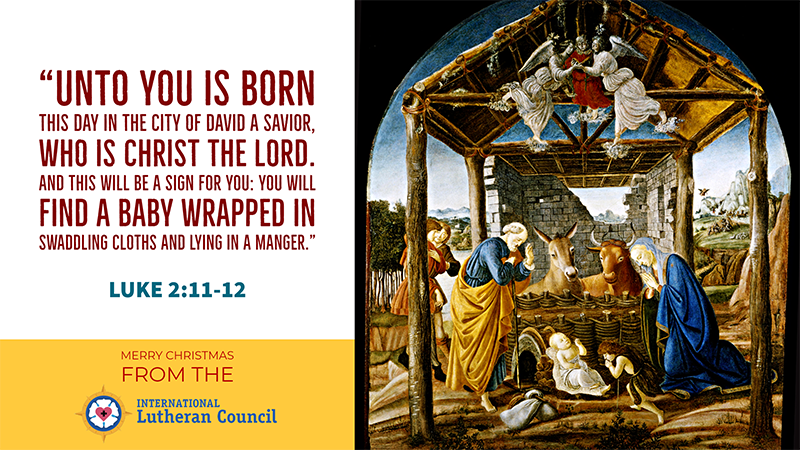
———————

———————
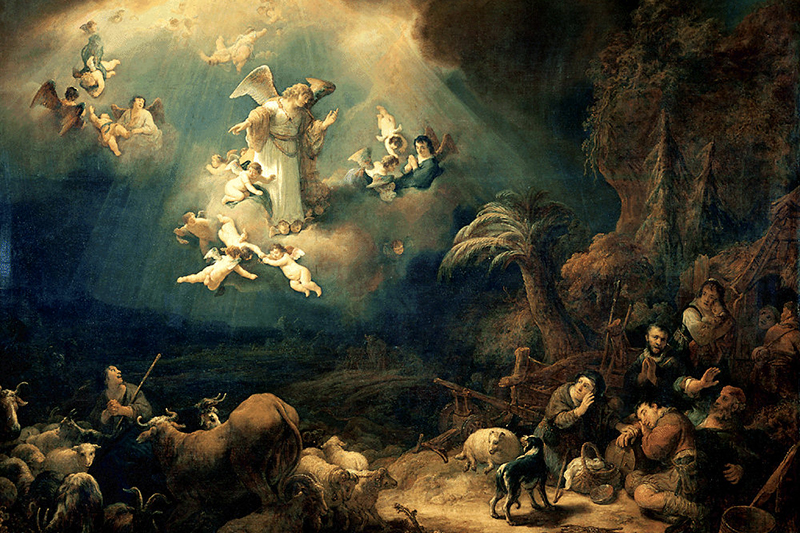
The annunciation to the shepherds, Govert Flinck: 1639.
by Timothy Quill
This past Sunday was the last in Advent, and once again immediately following the Kyrie ,the pastor went directly into the Greeting and Salutation: “The Lord be with you,” “and with your spirit.” The Gloria in Excelsis was nowhere to be found. It has been gone since the first Sunday in Advent.
When Martin Luther undertook his remarkable 1526 restoration and German translation of the Latin Mass, he did not include the ancient Gloria in Excelsis. How was it possible for someone as theologically and musically gifted as Dr. Luther to delete the Gloria? At first glance this seems a bit baffling, but a closer look reveals that the reason for the omission was most likely because the German Mass was first sung in December of 1525 which put it during the penitential season of Advent when the Gloria was not customarily sung. New compositions of the Gloria would eventually be composed by Nicolaus Decius, Luther, and others.
The Gloria is also omitted during the penitential season of Lent, but its omission is most striking during the Advent-Christmas season since it is the song of the angels to the shepherds on the night of Jesus’ birth.
Lutherans greatly value and retain the traditional liturgical practices of the church.
In the Introduction to his 1523 revision of the Latin Mass, Luther explained: “It is not now or ever has been our intention to abolish the liturgical service of God completely, but rather to purify the one that is now in use from accretions which corrupt it and to point out an evangelical use.” He commends those parts of the service added by the early church fathers and recommends they be retained in the liturgy: Psalms and Introit Psalm, Kyrie, Readings from Epistle and Gospel, Gloria in Excelsis, and so forth (LW AE 53:20-21).
In 1530, the Lutherans confessed in Article 15 of the Augsburg Confession, “We gladly keep the old traditions set up in the church because they are useful and promote tranquility, and we interpret them in an evangelical way, excluding the opinion which holds that they justify” (Ap XV, Tappert 220:38, emphasis mine).
One year after the Diet of Augsburg, Luther was preaching at St. Mary’s parish church in Wittenberg. He expressed amazement that the evangelical movement was still alive: “A year ago, at the Diet of Augsburg, the [general] opinion was that everything would go topsy-turvy within four weeks, and that all Germany would founder. [No one knew how things would end up,] or from what source help and comfort might come. The situation baffled and defied all reason and wisdom, and one was constrained to say: ‘It all depends on God’s power, and it is all staked on His Word’” (LW AE 23:400).
It is now 489 years after the Diet of Augsburg and the world in which we live—including numerous churches which bear the names “Evangelical” and “Lutheran”—are in many respects topsy-turvy, upside down, and in a state of confusion. And we too are led to express amazement and thanksgiving that after all she has gone through, the Lutheran Church has not foundered. She continues to depend on “God’s power, and it is all staked on His Word.” This is articulated on the International Lutheran Council website: “The International Lutheran Council is a growing worldwide association of established confessional Lutheran church bodies which proclaim the Gospel of Jesus Christ on the basis of an unconditional commitment to the Holy Scriptures as the inspired and infallible Word of God and to the Lutheran Confessions contained in the Book of Concord as the true and faithful exposition of the Word of God” (emphasis mine). It is extremely encouraging to know that we are not alone. Over 50 churches worldwide have chosen to be part of an association of confessional Lutheran church bodies which share this commitment to the Gospel and the Word of God.
Martin Luther retained the historic liturgy but insisted that it be in the vernacular, so that the people could understand and participate meaningfully in the Divine Service. For this reason, the Gloria in Excelsis was also composed in hymn form in order to foster congregational singing.
As Advent gives way to Christmas, ILC Churches from many countries and cultures will worship in different languages yet share in the common faith, the common Lutheran confession, and common Lutheran liturgical tradition. In the Divine Service the Lord Jesus Christ, the incarnate Word made flesh, comes to us through the Word and in his very Body and Blood in the Blessed Sacrament to bestow upon us the forgiveness of sins, life, and eternal salvation. Lutherans from all ages and throughout the world join the angels, who sang to the shepherds when Jesus was born in Bethlehem: “Glory be to God on high; and on earth peace, goodwill toward men” (Luke 2:14).
All glory be to God alone,
Forever more the highest one,
Who did our sinful race befriend
And grace and peace to us extend.
Among us may His gracious will
All hearts with deep thanksgiving fill.
– Martin Luther, All Ehr und Lob, stanza 1
———————
Rev. Dr. Timothy Quill is General Secretary of the International Lutheran Council.
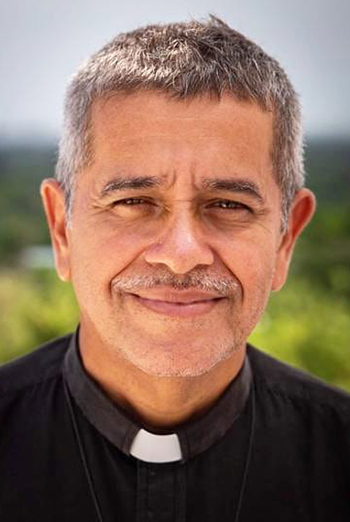
Rev. Luis Coronado. (Photo: Johanna Heidorn, ILV social media.)
VENEZUELA – The Lutheran Church of Venezuela (Iglesia Luterana de Venezuela – ILV) has announced that their former president, Rev. Luis Gregorio Coronado, has been murdered.
Rev. Coronado was reported missing on December 12. He was found deceased, with his hands and feet bound, on December 16 in a vacant missionary residence building owned by the church.
“The blood of a saint cries out,” the Venezuelan church wrote, announcing his death. “His work for both the local and national church was faithful and constant…. As a national church, we thank God for his service, his friendship, and his love.”
Rev. Coronado was elected to a two-year term as President of the Lutheran Church of Venezuela in November 2009. He had previously served the ILV as Vice President, and was pastor of Lutheran Church Fountain of Life (Iglesia Luterana Fuento de Vida) in Puerto Ordaz (Guayana City) for more than two decades. At the time of his death, Rev. Coronado was also serving as Pastoral Counsellor for southern Venezuela.
Rev. Coronado is survived by his wife and three children.
The ILV issued a prayer remembering Rev. Coronado and asking comfort for his family which reads in part:
“O God of grace and glory, we remember our pastor who is now in your eternal presence. We thank You for making him a shepherd of your flock, and for giving us the opportunity to know him as your servant in our pilgrimage on earth. In your kind compassion, comfort the Coronado family and your church in these moments of grief. Give us faith to see that death is the door to eternal life, so that with confidence we can continue our journey here on earth, until You call us to meet with those who have gone in the faith before us—through Jesus Christ, Your Son, our Lord, who lives and reigns with You and the Holy Spirit, one God now and forever. Amen.”
The Lutheran Church of Venezuela is a member of the International Lutheran Council, a global association of confessional Lutheran church bodies.
———————
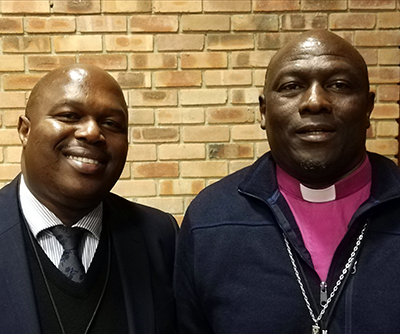
LCSA Deputy Bishop Mandla Thwala and Bishop Modise Maragelo.
SOUTH AFRICA – The Lutheran Church in Southern Africa (LCSA) held its General Synod in Wittenberg, South Africa from December 2-5, 2019, during which time the church reelected Bishop Modise Maragelo and Deputy Bishop Mandla Thwala to another five year term in office.
The General Synod was held under the theme “Acta non verba” (“Actions not words”), based on James 2:26b: “Faith apart from works is dead.” With this verse, the LCSA’s church council encouraged its members to remember that all decisions taken must be implemented for the wellbeing of the Church of Christ. The importance of good governance was stressed by Bishop Maragelo.
In the report of the church council, the Bishop highlighted several major events over the past few years, including: the appointment of a General Secretary and a Treasurer; the celebration of the 500th anniversary of the Reformation and the 50th anniversary of the LCSA in 2017; a joint pastors’ convention held with the Free Evangelical Lutheran Synod in South Africa (FELSISA) in 2018; and workshops organized for preachers, deaconesses, deans, and deputy deans.
Guests in attendance at the event included Bishop Dieter Reinstorf of FELSISA; Mission Director Roger Zieger from the Lutherische Kirchenmission, the Mission Society of Germany’s Independent Evangelical Lutheran Church (SELK); and Rev. Dr. Walter Winterle, rector of the Lutheran Theological Seminary in Tshwane (Pretoria).
———————
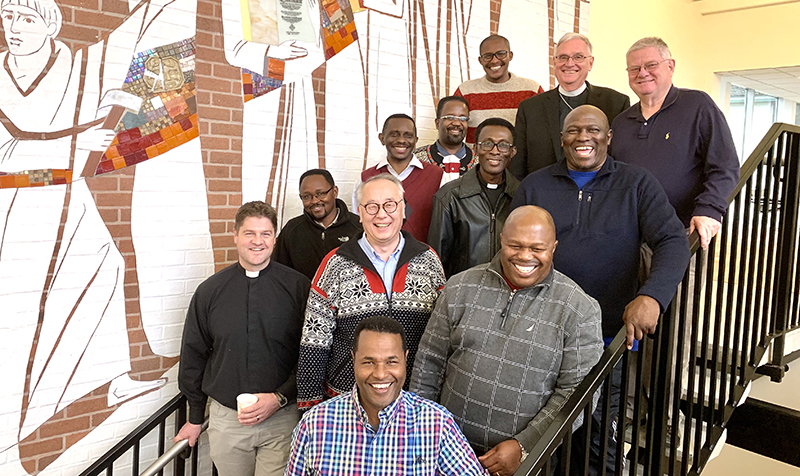
LLDP participants in the November 2019 classes pose with LLDP instructors. [Left-most row, l-r diagonally ascending the stairs: Deputy Bishop Helmut Paul (FELSISA); District Pastor Daniel Mono (ELCT-SELVD); Bishop Emmanuel Makala (ELCT-SELVD); General Secretary Teshome Amenue (EECMY); Tsegahun Assefa, Director of Children and Youth (EECMY). Middle row, l-r diagonally ascending the stairs: Rev. Dr. Naomichi Masaki, LLDP Director; President John Donkoh (ELCG); and Rev. Dr. Timothy Quill, LLDP faculty and General Secretary (ILC); Right-most row, l-r diagonally ascending the stairs: Rev. Dr. Bruk Ayele (EECMY); Deputy Bishop Mandla Thwala (LCSA); Bishop Modise Maragelo (LCSA); and Professor John Pless, LLDP faculty and Assistant Professor (CTSFW).]
During the first week of classes, Rev. Dr. Christian Ekong, Archbishop of the Lutheran Church of Nigeria, taught a course entitled “Ecclesial and Organizational Leadership.” Archbishop Ekong challenged the students to resist the “leadership syndrome” in which church officials compete for a higher position in the church. Instead, he said, they must understand that church leadership is about service. “If a leader is elected because he has merited a leader’s position, he is in the position of leadership to be served,” he said. “But if a leader understands he is called by God, then that leader will know he is called to serve the church.”
To that end, Archbishop Ekong guided the class into a Scriptural study of ecclesial leadership. Participants expressed gratitude for the class, noting that Archbishop Ekong could speak directly to the challenges and opportunities of church leadership in an African context—challenges they face on a regular basis. The current class of students in the LLDP all come from Africa, with participants in November’s classes attending from Ghana, South Africa, Tanzania, and Ethiopia.
During the second week, Rev. Dr. John Pless, Assistant Professor of Pastoral Ministry and Missions at CTSFW, taught a course on “Responding to Contemporary Issues and Neo-Pentecostalism.” The church faces new challenges in every era, and these call for a careful confessional Lutheran response. Dr. Pless provided timely assistance to the church leaders participating in the LLDP, providing resources, presenting the roots and manifestations of key contemporary spiritual and theological movements, and assisting participants in responding to issues facing their own churches.
The class discussed not only Neo-Pentecostalism but also contemporary theological issues related to the church growth movement, contextualization, women’s ordination, homosexuality, and Luther’s Two Kingdom doctrine, with particular emphasis on their relevance to the Global South. In addition, Dr. Pless introduced Herman Sasse’s writings as reliable theological contributions in answering contemporary issues.
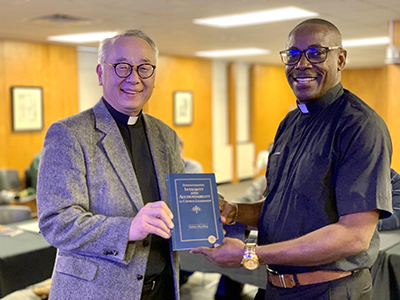
LLDP Director Naomichi Masaki and LCN Archbishop Christian Ekong show Dr. Ekong’s new book, Strengthening Integrity and Accountability in Church Leadership.
Students in November’s classes benefited from two texts recently published by Concordia Publishing House (CPH). The first book, Strengthening Integrity and Accountability in Church Leadership, is by Archbishop Ekong and served as a textbook for his course. “Church leaders are often exposed to temptations to profit because of their privileges,” notes a summary on CPH’s website. “When church leaders give in to these temptations to profit from the privileges of leadership, it gives reason to question their motives.” Instead, Dr. Ekong explains, church leaders are to emulate Jesus and the Apostles “who shepherded God’s people and protected them from the wolves.”
The second work is a reprint of Victor C. Pfitzner’s Led by the Spirit: How Charismatic is New Testament Christianity? When the book was first published by the Lutheran Church of Australia in 1976, “the Charismatic Movement was having a broad impact in denominations in North America, Europe, and Australia,” notes a summary on CPH’s website. Since then the movement has spread to other parts of the globe, making Pfitzner’s careful exegetical study of continued relevance. “This classic book on the subject has been reprinted to assist churches around the world in dealing with this challenge and in formulating a confessional Lutheran response.”
“CPH has been a most helpful partner to the International Lutheran Council and the work of the Lutheran Leadership Development Program,” noted Rev. Dr. Naomichi Masaki, LLDP Director and a professor with CTSFW. “It’s a blessing to work with them to publish these solid Lutheran resources not only for students in the LLDP but also for use by the wider Lutheran community.”
You can purchase Strengthening Integrity and Accountability in Church Leadership and Led by the Spirit: How Charismatic is New testament Christianity? at Concordia Publishing House’s website online.
“With the publication of these two works, we now have three books published by Concordia Publishing House that bear the LLDP logo,” noted Dr. Masaki. “The church leaders in our current LLDP class and I are deeply thankful that CPH keeps rendering such excellent work for the church around the globe.”
LLDP students also received copies of Hermann Sasse’s Letters to Lutheran Pastors during the November classes.
The LLDP is a two-year certificate program of the International Lutheran Council (ILC). The program aims to provide Lutheran church bodies around the world with the opportunity to develop leaders who are competent in both solid confessional Lutheran theology as well as practical skills in leadership and resource management.
“It remains my privilege and joy to spend time with these wonderful men of God and the leaders of various churches,” said Dr. Masaki. “May the Lord continue to use the LLDP for confessional fellowship and to foster mutual support and encouragement among those who serve as leaders in their respective Lutheran church bodies.”
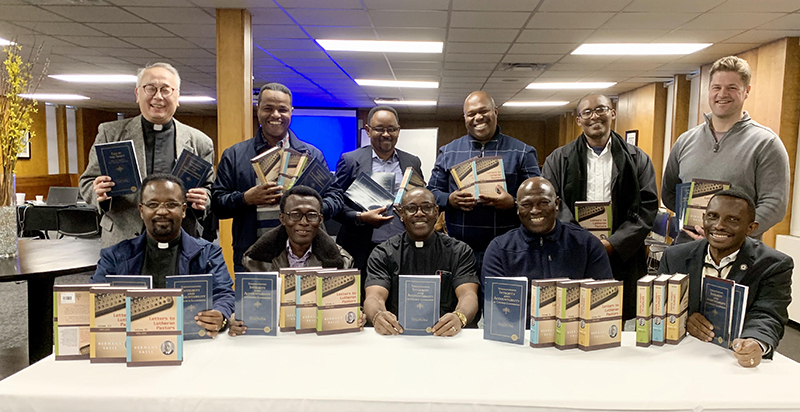
Dr. Masaki and LLDP participants display books received during the latest round of classes.
Nine participants attended the November sessions of the LLDP at Concordia Theological Seminary in Fort Wayne, Indiana: Rev. John Donkoh, President of the Evangelical Lutheran Church of Ghana (ELCG); Rev. Modise Maraglo, Bishop of the Lutheran Church in Southern Africa (LCSA); Rev. Mandla Thwala, Deputy Bishop of the LCSA; Rev. Helmut Paul, Deputy Bishop of the Free Evangelical Lutheran Synod in South Africa (FELSISA); Rev. Dr. Emmanuel Makala, Bishop of the South East of Lake Victoria Diocese of the Evangelical Lutheran Church in Tanzania (ELCT-SELVD); Rev. Dr. Daniel Mono, District Pastor of the ELCT-SELVD; Rev. Teshome Amenu, General Secretary of the Ethiopian Evangelical Church Mekane Yesus (EECMY); Mr. Tsegahun Assefa, Director of Youth and Children of the EECMY; and Rev. Dr. Bruk Ayele, President of Mekane Yesus Seminary of the EECMY. Dr. Ayele is a new participant of the LLDP beginning with the November 2019 classes.
Given that all current participants in the Lutheran Leadership Development Program hail from Africa, plans are underway to hold one of 2020’s LLDP two-week sessions in Africa.
You can support the LLDP by making a donation online. You can also make a donation by cheque to:
International Lutheran Council
P.O. Box 18775
St. Louis, MO 63118
———————
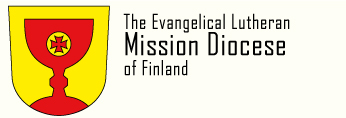 FINLAND – The Evangelical Lutheran Mission Diocese of Finland (Suomen evankelisluterilainen Lähetyshiippakunta – ELMDF) is under investigation by Finland’s Prosecutor General for the publication of a booklet upholding historic Christian teachings on human sexuality.
FINLAND – The Evangelical Lutheran Mission Diocese of Finland (Suomen evankelisluterilainen Lähetyshiippakunta – ELMDF) is under investigation by Finland’s Prosecutor General for the publication of a booklet upholding historic Christian teachings on human sexuality.
The Luther Foundation Finland (Suomen Luther-säätiö)—the legal entity behind the ELMDF—is being investigated for its 2004 booklet “Male and Female He Created Them: Homosexual Relationships Challenge the Christian Concept of Humanity.” The Prosecutor General alleges that the booklet incites hatred against homosexual people, despite an earlier decision by Helsinki Police which concluded no crimes had been committed. Same-sex marriage has been legal in Finland since 2017.
“The decision of the Prosecutor General to conduct a preliminary investigation of our publication is surprising, as I believe the police have already thoroughly investigated and concluded that this is not a criminal offense,” said Rev. Juhana Pohjola, the Dean of the ELMDF. “It is our job to teach the entire Word of the Bible in peace, including on marriage as created by God.”
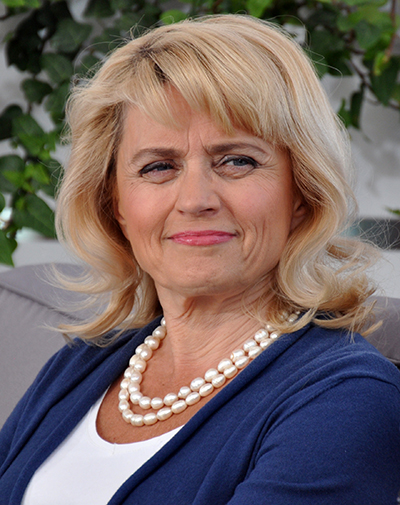
Dr. Päivi Räsänen
The booklet’s author, Dr. Päivi Räsänen is also under investigation by the Prosecutor General. Dr. Räsänen is a Member of Parliament in Finland and former Minister of the Interior.
The booklet, which has recently been made available in English translation online, argues that homosexual activity must be identified as sin by the Church on the basis of the teachings of Scripture. A failure to recognize sin as sin undermines the very need for a Saviour, Dr. Räsänen writes. “If God is not the Holy God who condemns sin as described in the Bible—including homosexual behaviour—why did the Son of God have to die?” Dr. Räsänen asks. “If we deny people the right to feel guilt for their sin, we also deprive them of the joy and assurance of the Gospel. The certainty of heaven rests on Christ’s assured atonement for our very real sins and on His resurrection from the dead.”
Additional information on the case, including links to English reporting on the situation, are available from the website of the Evangelical Lutheran Mission Diocese of Finland. A pdf of the booklet in English translation can be read online here.
The ELMDF is a member of the International Lutheran Council, a global association of confessional Lutheran church bodies which uphold the authority of Scripture in all aspects of faith and life.
———————
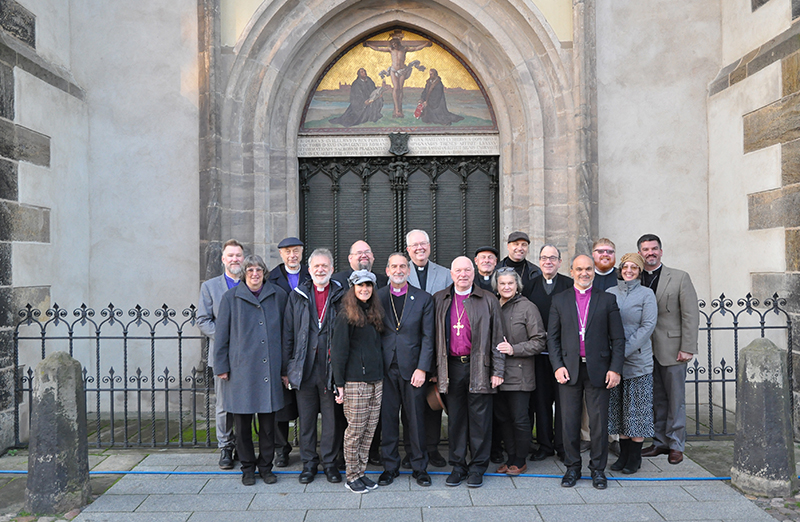
Participants in the latest round of ACNA-LCC-LCMS talks meet in Wittenberg, Germany. Representatives of the Anglican Church in North America during these meetings included: ACNA Archbishop Foley Beach; the Rev. Peter Frank, ACNA pastor; the Rev. Dr. Jonathan Riches, Reformed Episcopal Seminary rector and professor; and Reformed Episcopal Church (REC) Presiding Bishop Ray Sutton, ACNA Dean of Ecumenical Affairs. Representing the Lutherans were LCC Past President Robert Bugbee; the Rev. Joel Kuhl, Chairman of LCC’s Commission on Theology and Church Relations (CTCR); the Rev. Dr. Joel Lehenbauer, Executive Director of the LCMS’ CTCR; and the Rev. Larry Vogel, Associate Executive Director of the LCMS’ CTCR. International guests included: the Rev. Dr. Christoph Barnbrock, Rector and Professor at SELK’s seminary Lutherische Theologische Hochschule; outgoing Evangelical Lutheran Church in England (ELCE) Chairman Jon Ehlers; Free Church of England (FCE) Bishop John Fenwick; Reformed Episcopal Church in Germany (Anglikanische Kirche in Deutschland – AKD) Bishop Gerhard Meyer; Reformed Episcopal Church in Croatia (Protestantska Reformirana Kršćanska Crkva – PRKC) Bishop Jasmin Milić; SELK Bishop Emeritus Jobst Schöne; SELK Bishop Hans-Jörg Voigt, and the Rev. Dr. Vatroslav Župančić of the United Methodist Church in Germany (Evangelisch-methodistische Kirche – EMK.
GERMANY – The respective chairmen of the International Lutheran Council (ILC), Bishop Hans-Jörg Voigt, and of the Global Anglican Future Conference (GAFCON), Archbishop Foley Beach, met in Wittenberg on October 30 during the latest round of dialogue between confessional Lutherans and Anglicans from North America.
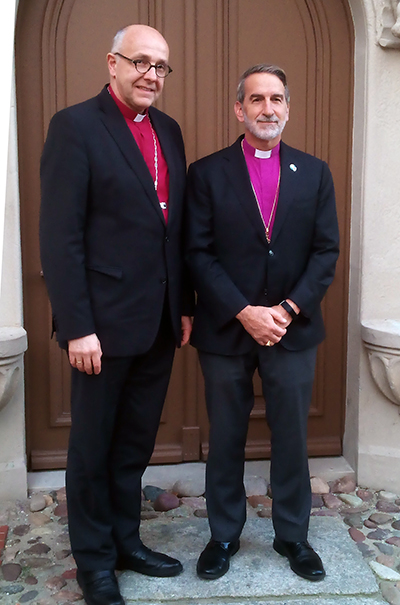
ILC Chairman Hans-Jörg Voigt and GAFCON Chairman Foley Beach meet at the International Lutheran Center at the Old Latin School in Wittenberg, Germany.
Bishop Voigt is the spiritual leader of Germany’s Independent Evangelical Lutheran Church (Selbständige Evangelisch-Lutherische Kirche – SELK) of Germany, and has served as ILC Chairman since 2010. Archbishop Beach is Primate of the Anglican Church in North America (ACNA) and is currently Chairman of the GAFCON Primates’ Council. The ILC is a growing association of confessional Lutheran church bodies committed to the authority of Holy Scripture as God’s written Word, and to the biblical Gospel of Jesus Christ as the heart of the Church’s faith and mission. GAFCON was born out of the realignment of world Anglicanism, as those who uphold the authority of Scripture banded together to respond to theological and spiritual decay within the Anglican communion. The churches associated with GAFCON now represent around 50 million of the 70 million Anglicans around the world.
“The theological and historical background of GAFCON deeply impressed me,” noted Bishop Voigt. “Their understanding of Holy Scripture is very close to that of ILC churches,” he continued, while acknowledging there remain differences of theology between the two organizations which would benefit from further dialogue.
For nearly a decade, representatives of The Lutheran Church—Missouri Synod (LCMS), Lutheran Church-Canada (LCC) and the ACNA have carried out semi-annual dialogue meetings, rejoicing in their discovery of substantial biblical teaching held in common. The decision was made to hold this fall’s round of talks at Wittenberg’s Old Latin School, an agency of the LCMS, SELK and ILC, to afford the regular participants an opportunity to be introduced to each other’s European partners and mark the 502nd anniversary of the Reformation together. In that context Bishop Voigt traveled to Wittenberg and had opportunity to speak with Archbishop Beach, who was present for the regular dialogue meetings. The head of the Evangelical Lutheran Church in England was also present, as were Anglican bishops from the United Kingdom, Germany, and Croatia.
Much of the week’s discussions provided an opportunity for those present to introduce the churches they serve. In addition, there was significant attention given to the possibilities for cooperation in theological education in Europe. Participants also toured historical Luther sites throughout Wittenberg, and in the town of Eisleben, where Luther was born and also died. On the early morning of Reformation Day, the group walked to the famous Thesentür (“theses door”) of Wittenberg’s Castle Church to offer prayers to the Lord and to acknowledge His grace in uncovering the truth of the Gospel at the time of the Reformation 502 years ago.
For more information on the dialogue meetings held in Wittenberg, see this release from the Anglican Church in North America, Lutheran Church–Canada, and the Lutheran Church–Missouri Synod.
———————
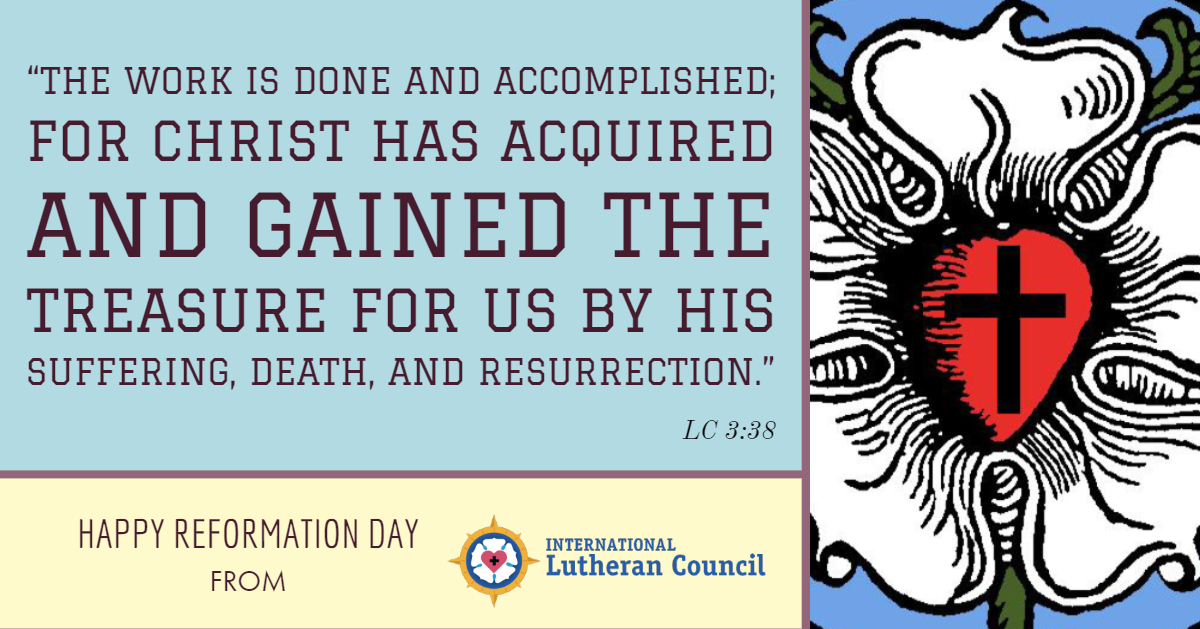
———————
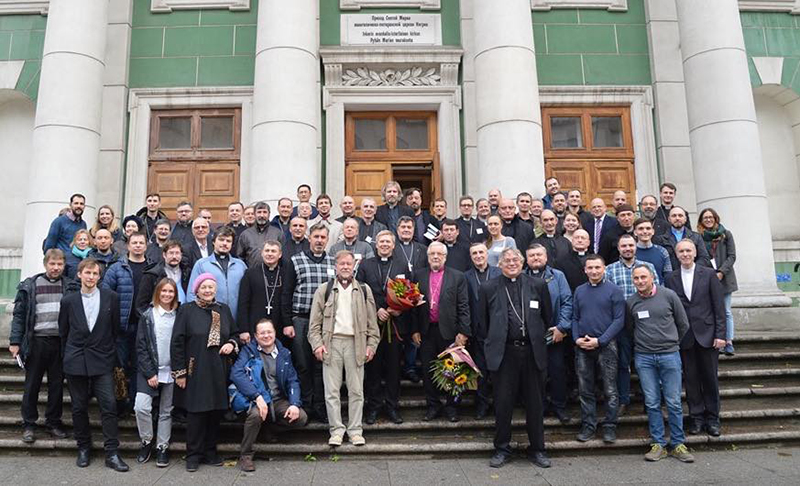
The Evangelical Lutheran Church of Ingria holds its 30th Synod in St. Petersburg, Russia. (Photo: ELCI News, Liliann Keskinen).
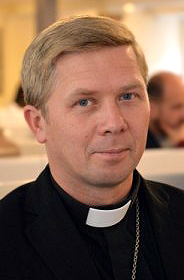
Bishop Elect Ivan Laptev.
RUSSIA – The Evangelical Lutheran Church of Ingria (ELCI) in Russia elected Rev. Ivan Laptev to be their new bishop during the church’s 30th Synod held October 18-19, 2019 at St. Mary Cathedral in St. Petersburg. Rev. Laptev will be installed as bishop on February 9, 2020.
Rev. Laptev was elected on the second ballot, receiving 48 votes out of the total 80 ballots cast. Other candidates for bishop who had allowed their names to stand were Rev. Olav Panchu, Rev. Mikhail Ivanov, and Rev. Ivan Hutter.
Rev. Laptev, born in 1979, is rector of the Theological Institute of the Church of Ingria. He further serves as head pastor of St. John the Baptist Church in Gubanitsy and as pastor of St. George’s Church in Koltushi. All candidates for the position of bishop were required to have served at least ten years in the Church of Ingria; to have higher theological education; to have a good reputation; and to be no less than 35 years of age.
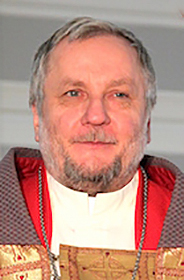
Bishop Arri Kugappi.
Rev. Ivan Laptev will succeed Bishop Arri Kugappi, who is soon to reach the ELCI’s canonical age of retirement; synodical statutes require the bishop to retire no later than 67 years of age, which Bishop Kugappi will reach in February 2020. Bishop Kugappi was ordained as bishop in 1996. From 1993-1995, he served as Bishop’ Vicar. He was ordained a deacon in 1990 and a pastor in 1992.
The ELCI’s 2018 synodical gathering had voted to make an exception in the case of Bishop Kugappi to allow hm to serve until seventy years of age. However, constitutional difficulties became apparent thereafter and so Bishop Kugappi advised the Synodical Council that he would leave the episcopal ministry in February 2020 as originally called for in church bylaws.
In the run-up to the election, the church met at St. Mary Cathedral in St. Petersburg for an Extraordinary Meeting of the Synod on September 14, 2019 to consider and approve amendments to church law.
The Evangelical Lutheran Church of Ingria is a member church of the International Lutheran Council, a global association of confessional Lutheran churches.
———————
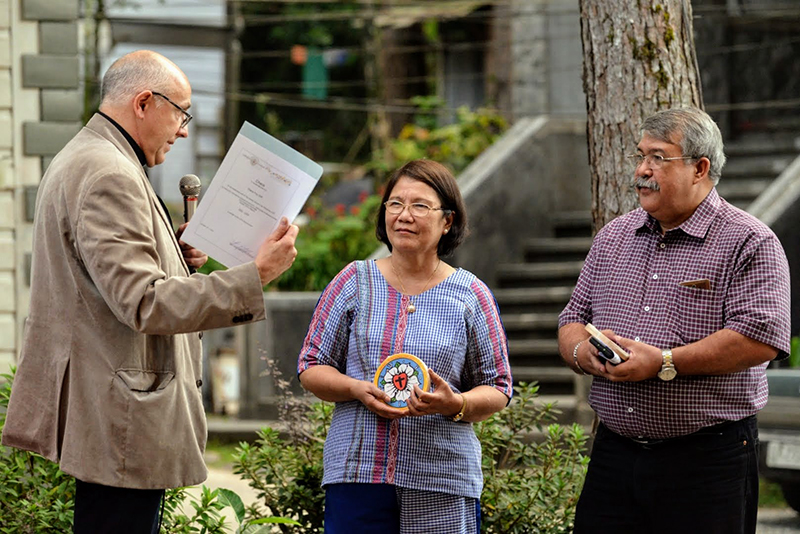
ILC Chairman Hans-Jörg Voigt (left) thanks President Antonio del Rio Reyes and Arlene Reyes for the hospitality of the Lutheran Church of the Philippines during the 2019 World Seminaries Conference.
PHILIPPINES – The International Lutheran Council’s 7th triennial World Seminaries Conference came to an end on October 18, 2019. The conference had been meeting in Baguio City, Philippines since October 15.
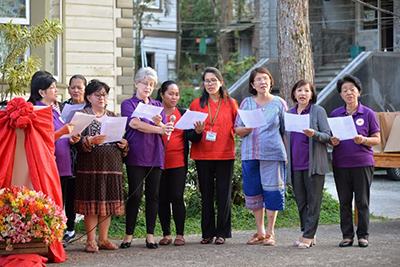
The Lutheran Church of the Philippines provided entertainment for the conclusion of the 2019 World Seminaries Conference.
The morning began with worship, as did every day during the conference, following which representatives from each of the ILC’s five world regions were invited to respond to the conference’s presentations. Speakers included Dr. Cynthia Lumley (Evangelical Lutheran Church of England); Rev. Dr. Bruk Ayele Asale (Ethiopia Evangelical Church Mekane Yesus); Rev. Dr. Samuel Liu (Taiwan’s China Evangelical Lutheran Church); Rev. Dr. Sergio Schelske (Evangelical Lutheran Church of Argentina); and Rev. Dr. James Gimbel (Lutheran Church–Canada).
A recurring theme in their talks was gratitude for the various talks discussing Lutheran identity in different cultural contexts. Dr. Asale expressed joy over the mutual commitment to Scripture and the Lutheran Confessions which binds the participants in the conference together, even as they recognize that we must be sensitive to differences in cultural contexts—something Dr. Liu also noted. Dr. Schelske noted that we all have blind spots and that conferences like confessional Lutherans around the world learn from each other, while together focusing on Jesus Christ. Dr. Gimbel reiterated the necessity of recognizing the cruciform nature of Lutheran identity—vertically in relation to God and horizontally in our culturally-conditioned relationships with our neighbour. Dr. Lumley highlighted the value of the work done on identifying a common curriculum for confessional Lutherans around the world.
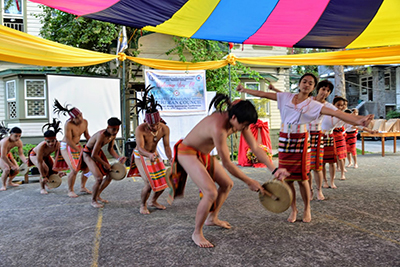
The Lutheran Church of the Philippines highlighted cultural celebrations as part of closing events of the 2019 World Seminaries Conference.
All of the major papers presented during the conference will be printed in both English and Portuguese in the theological journal of Seminario Concordia, a seminary of the Evangelical Lutheran Church of Brazil.
In the afternoon, participants had the opportunity to tour Baguio City, ending at the Lutheran Church of the Philippines’ Lutheran Theological Seminary. There delegates were treated to wonderful cultural celebrations by members of St. Stephen Lutheran Church as well as the seminary community. A fellowship dinner featuring local Filipino cuisine was a highlight of the event. Following the meal, the ILC World Seminaries Conference drew to a close with a closing program with expressions of gratitude to the Lutheran Church of the Philippines for hosting the conference.
A total of 23 theological institutions were represented at the conference, with participants coming from Argentina, Brazil, Canada, Chile, England, Ethiopia, Germany, Ghana, Guatemala, India, Indonesia, Latvia, Norway, Philippines, Russia, South Africa, South Korea, Sweden, Taiwan, Tanzania, the United States of America, and Venezuela.
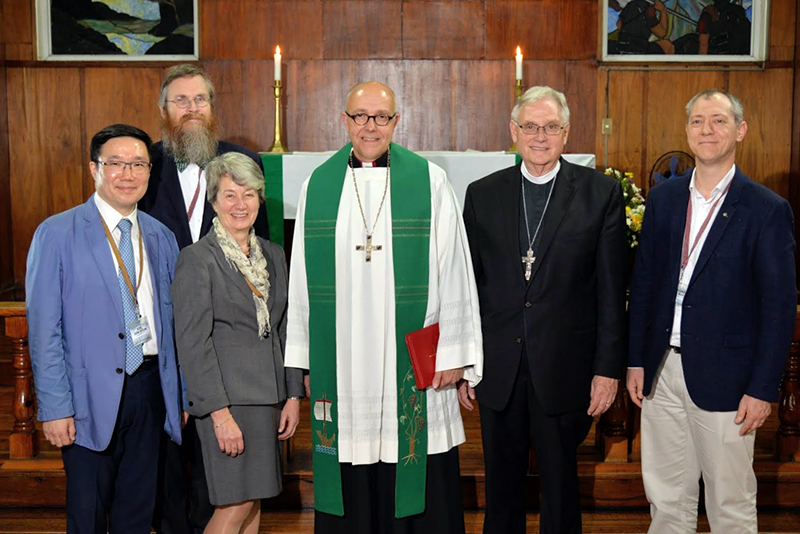
The newly installed World Seminaries Committee with ILC Chairman Hans-Jörg Voigt and newly appointed ILC General Secretary Timothy Quill. Pictured (l-r): Rev. Dr. Jun Hyun Kim, Rev. Dr. Roland Ziegler, Dcn. Dr. Cynthia Lumley, ILC Chairman Hans-Jörg Voigt, ILC General Secretary Timothy Quill, and Rev. Dr. Sergio Schelske.
The conference also saw the installation of a new board for the ILC’s Seminaries Relations Committee. The new members include: South Korea’s Rev. Dr. Jun Hyun Kim (Asia World Region); England’s Dcn. Dr. Cynthia Lumley (Europe World Region); Argentina’s Rev. Dr. Sergio Schelske (Latin America World Region); and the United States’ Rev. Dr. Roland Ziegler (North America World Region). The new board was installed by ILC Chairman Hans-Jörg Voigt during Vespers on October 17.
The next ILC World Seminaries Conference will take place in 2022.
Find all news reports from the 2019 World Seminaries Conference here.
———————